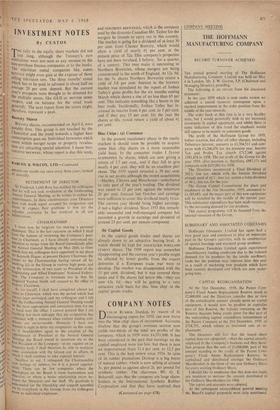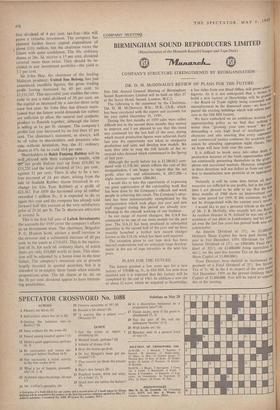COMPANY NOTES
DUNLOP RUBBER. Dunlop, by reason of its encouraging report for 1959, can now move into the 'blue chip' class of investment. Accounts disclose that the group's. overseas section now yields two-thirds of the total net profits of the company, which in 1959 were £4,351,000. It has been considered in the past that earnings on the capital employed were too low, but there is now an improvement from 11.4 per cent. to 12.5 per cent. This i the best return since 1954. In spite of its rubber plantations Dunlop is a big buyer of natural rubber, which is now selling at around 3s. per pound as against about 2s. per pound for. synthetic rubber. The chairman, Mr. G. E. Beharrell, says that the company are large share- holders in the International Synthetic Rubber Corporation and that they have received. their
(Continued on page 676) first dividend of 4 per cent. tax-free—this will prove a valuable investment. The company has planned further heavy capital expenditure of 1 about £10+ million, but the chairman views the future with quiet confidence. The 10s. ordinary shares at 26s. 3d. receive a 15 per cent. dividend covered more than twice. They, should be in- cluded in any investment portfolio—the yield is 5.7 per cent. Sir John Hay, the chairman of the leading Malayan producer, United Sun Betong, has just announced excellent figures, the gross trading profit having increased by 60 per cent. to £1,151,385. This successful year enables the com- pany to pay a total dividend of 50 per cent. on the capital as increased by a one-for-three scrip issue last year. Sir John Hay has always main- tained that the future world demands for rubber are sufficient to allow the natural and synthetic product to flourish together, although the latter is selling at Is. per lb. cheaper. The company's profits last year increased by no less than 65 per cent. The chairman's statement, as always, will be of value to shareholders and investors who can, without hesitation, buy the £1 ordinary shares at 97s. 6d. to yield 10.8 per cent.
Shareholders in Bukit Panjong Rubber will be well ,pleased with their company's results, with
net profit (before tax) up from £19,881 to £33,220 and the total dividend of 14,16 per cent., against 8f per cent. There is also to be a tax- free payment of 2d. per share, arising from the sale of Seafield Rubber shares (received in ex- change for Ulu Yam Rubber) at a profit of £21,367. For 1959 the harvested crop of rubber exceeded 1 million lb.; it is expected to do so again this year and the company has already sold forward half this amount at the very satisfactory price of 29.3d. per lb. The 2s. shares are attractive at around 3s.
This is the first full year of Lubok Investments; the accounts for 1959 cover the company's affairs as an investment trust. The chairman, Brigadier F. C. Hopton Scott, advises a small increase in the revenue and a substantial increase of 40 per cent, in the assets at £319,051. This is the equiva- lent of 9s. for each 6d. ordinary, share, of which there are only £18,000 worth in issue. This situa- tion will be adjusted by a bonus issue in the near future. The company's resources are at present largely invested in quoted securities, but it is intended to re-employ these funds when suitable propositions arise. The 6d. shares at 6s. 6d. on the 50 per cent. dividend appear to have interest- ing possibilities.







































 Previous page
Previous page